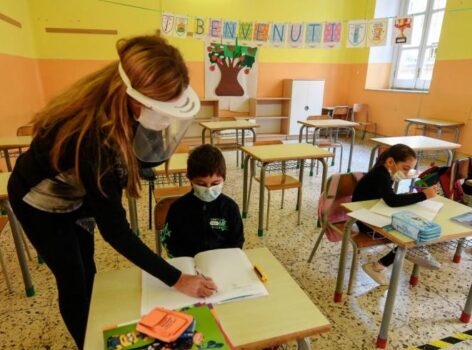Italy: Students with disabilities included in covid-19 education plans

Rome: The measures some schools in Italy took to ensure access to quality education for students with disabilities during Covid-19-related school closures should inspire other schools to follow suit, Human Rights Watch said. The steps provided safe opportunities where possible for in-person learning during the pandemic.
Online remote learning due to pandemic-related school closures was difficult for many children. But it has been especially challenging for many children with disabilities who may particularly benefit from in-person education and the routine of going to school. In addition, online remote learning was often inaccessible for children with disabilities in Italy, as in other countries, risking their exclusion from education altogether.
“When remote learning proved inaccessible to many students with disabilities, some schools in Italy were able to take steps so students could study safely in classrooms, with the support they needed,” said Karolina Kozik, disability rights officer at Human Rights Watch. “The measures these schools took show that there are ways to provide students with disabilities access to quality, inclusive education, even in an emergency.”
Human Rights Watch interviewed families and staff regarding practices at 14 schools in Italy with a variety of approaches to education for children with disabilities during the pandemic and looked in greater depth at two schools. Human Rights Watch did not analyze the overall response of the Italian education system to the education of children with disabilities during the Covid-19 pandemic, which was beyond the scope of this research.
This research focused specifically on identifying schools that were able to provide in-person education programs for students with disabilities when available online education was inadequate to meet the students’ needs. It highlights positive examples that countries may consider to ensure access to quality education for students with disabilities when schools are closed for public health emergencies.
Parents said that despite schools’ efforts and the availability of devices and internet connection, remote learning often did not meet the educational needs of their children, who required in-person support. One mother, whose 13-year-old son has autism and is nonverbal, said: “Some children with disabilities can access remote learning with ease, but for him it’s impossible. It’s impossible to attract his attention through a screen for more than four minutes.”
Several government decrees beginning in November 2020 relating to the pandemic included provisions allowing for in-person activities for students with disabilities when schools were otherwise closed. In March 2021 an Education Ministry note clarified that in-person education for students with disabilities was not automatic, but rather that schools should consider each individual case to meet the student’s educational needs while respecting safety measures to protect the right to health.
The option for in-person learning was offered as an essential reasonable accommodation for students with disabilities who could not benefit from remote learning, particularly students with intellectual and complex disabilities who receive support from support teachers and professional aides at school.
Following the shift to remote learning in November, officials at the Gaetano Salvemini public technical high school in Casalecchio di Reno, in the northern region of
Students sitting at a table listening to a teacher speaking.Click to expand Image
Students with and without disabilities at the Salvemini Technical High School in Casalecchio di Reno, Emilia-Romagna, Italy, during a class on the use of drones. © Private 2021
Emilia-Romagna, took the initiative to create small groups of about five students with and without disabilities who could choose to attend school in person when schools were otherwise closed. School officials chose students without disabilities to participate based on expressed interest and their specific challenges to participating in online learning. Each small group studied with teachers in the classroom, while other classmates joined the class online through interactive technology.
Students with and without disabilities who were part of inclusive groups appreciated the chance to attend school in person. “One of my friends told me it was a positive thing, also for [our classmate with disability], and so I decided to come,” said Giacomo, an 18-year-old student at the Salvemini high school. “The pandemic left a mark on us … and so I thought that perhaps in this dark time I could support [my classmate] … and now I’m also happier.”
Some schools instead offered students with disabilities the option to study individually in schools with support teachers and professional aides or to participate in workshops with other students with disabilities. Workshops included activities such as music, dance, and art. In some cases, classmates at home joined the children in the classroom via video calls.
Parents whose children attended school in person said that it was essential for their quality education. One mother of a 14-year-old boy with an intellectual disability and epilepsy said that the option for him to attend school was “like manna from heaven,” particularly given that schools were among the only institutions that continued to operate, while other support services and activities were suspended.
In both models, students with disabilities were given the choice of in-person learning or to continue remotely, as most students did. Students and parents stressed the importance of having this choice.
Human Rights Watch could not confirm how many schools in Italy offered in-person education for children with disabilities due to the lack of available data. Organizations representing people with disabilities and their family members have criticized the overall record of schools across Italy during the pandemic, noting that many children with disabilities did not receive a quality, inclusive education or, in some cases, any education at all.





